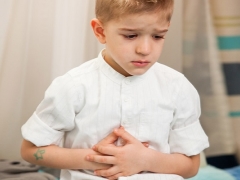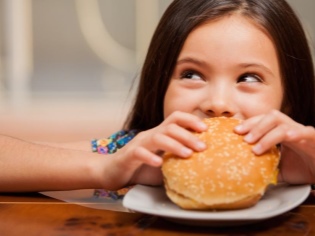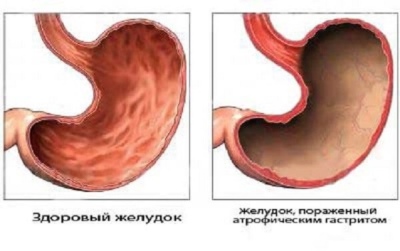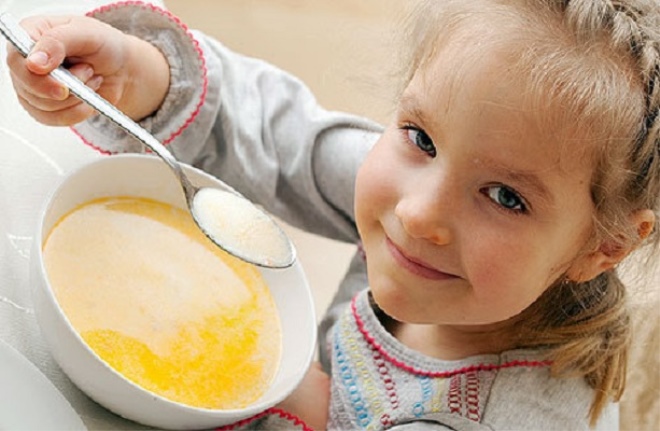Symptoms and treatment of gastritis in children
More recently, it was considered that gastritis is a professional disease of adults who do not have the opportunity to fully eat hot meals during the day. Taxi drivers, salesmen, managers of various levels were treated for this disease. However, today gastritis is rapidly becoming “younger”, and 5-6 year old children are already ill - and even newborns. About why gastritis develops in children, how to recognize it, what are the symptoms and treatment, you will learn by reading this article.
About the disease
Gastritis is a common ailment of the digestive system, in which the gastric mucosa is subjected to inflammatory changes. Moreover, the changes are sometimes dystrophic. The disease develops and takes quite a long time without showing itself.
As a rule, by the time the disease is detected, the mucous membranes are already beginning to break down - the normal glands are replaced by fibrous tissue, and the epithelial cells that make up the stomach membrane are completely atrophied. As a result, the stomach ceases to perform part of its functions (secretory), and this has unpleasant consequences.
When gastritis in the body is a stormy immune process. When any bacteria or representatives of other species that the gastric juice cannot cope on its own can enter the stomach, the omnipresent immunity is taken into account. He begins by all means to try to restore the integrity of the membranes of the stomach, strikes at malicious enemies, as a result of which the inflammation starts. This process takes a long time, gradually totally changing the composition and function of the gastric inner lining.
In case of a disease not caused by immune intervention, the mucous membranes are affected by certain aggressive factors from the outside. The final result is the same - the composition of the gastric juice changes, its acidity increases or decreases, excellent conditions are created for the reproduction of pathogenic microorganisms, atypical cells can start to form, which subsequently lead to the appearance of malignant tumors of the stomach and esophagus.
Children's gastritis is usually registered at the age of 4-6 years or later, in school-age children.
Experts say that the culprit is poor nutrition, the bad habit of parents to feed the child for any reason with a variety of pills, the prevalence and popularity of fast food, as well as a significant deterioration of the environment and food quality.
Recently, however, more and more diseases are found even in infants.who still have no idea what a hamburger is, what it is eaten with. Their stomachs are affected by the quality of infant formula, the frequent experimentation of parents in changing these mixtures and during the introduction of complementary foods.
Classification
Gastritis on the duration of the pathology is acute and chronic:
- Acute form. It develops quite rarely, it is always a quick reaction of the organism to an aggressive factor. This can happen if a child has eaten food contaminated by pathogenic bacteria, if he swallowed something poisonous, toxic. Sometimes acute gastritis is a reaction to certain viruses that are able to survive in the aggressive environment of the gastric juice (for example, rotavirus). This condition may be preceded by taking certain medications that traumatize the tender inner lining of the child's stomach.
The severity of the condition depends on the subtypes of acute gastritis. Catarral - the simplest, arising in response to poor-quality food.Fibrinous (erosive) - quite heavy, it becomes a consequence of acid poisoning. The most difficult is necrotic gastritis. They speak about it in case of severe acute poisoning with concentrated acid, salts of heavy metals, it leads to the death of the tissues of the stomach.
- Chronic form. Among all established diagnoses of gastritis, chronic accounts for more than 80%. The disease becomes a sad reality with a long negative impact on the digestive organs. The most unusual is autoimmune gastritis, its mechanism is similar to an allergic reaction. Immunity attacks the cells of its own organism, taking them for hostile - due to protein-antigens.
The most common subspecies of chronic gastritis is infectious or bacterial.
Such a disease (according to scientists' assumptions) causes the notorious microbe of Helicobacter pylori. He is also guilty of inflammation of the duodenum, along with part of the stomach. This disease is called gastroduodenitis.
Another subtype of the disease is reflux-gastritis, a condition in which bile acids are injected into the stomach, which causes inflammation. In the case of a radiation ailment, the destruction of the inner lining of the primary radiation sickness.
The reasons
The sharp form of the disease in children cause quite certain factors. These are expired products, in which bacteria multiply, and chemicals that a child may taste on parental oversight, and poisons. Chronic disease causes more likely causes:
- Helicobacter pylori. The microbe, the name of which is so widely advertised by the manufacturers of heartburn drugs, is considered the main "culprit" of gastric problems. It was revealed only in the second half of the 20th century. His "father" is Australian doctor Barry Marshall. To prove his theory of the connection of bacteria with diseases of the digestive organs, he infected himself with this microbe, for which he was awarded the Nobel Prize in medicine in 2005.
Official medicine believes that this microbe is found in 80-90% of cases in patients with gastritis, however, people infected with Helicobacter pylori (and there are 9 of 10 on the planet), gastritis does not always develop.
Apparently, in the theory of Dr. Marshall there are still "white spots".
- Duodenogastric reflux. This is the cause of chronic gastritis in the case that the contents of the duodenum are regularly thrown into the stomach and irritate it.
- Power failure. This reason was considered the main one before the discovery of the bacterium Helicobacter pylori, now it is the second in probability, in any case, this factor will never be disregarded by the doctor. Under the violation means the irregularity of eating, imbalance of nutrients, chronic lack of vitamins and microelements, as well as eating foods that the child (due to the immaturity of enzyme metabolism) is still difficult to digest - fatty, fried, pickled, spicy, exotic.
- Reception of medicines. If a child takes a long time drugs that can irritate the gastric mucosa, the likelihood of chronic gastritis increases. These drugs include certain hormones, nonsteroidal anti-inflammatory drugs, products containing acetylsalicylic acid.
If these medicines are prescribed by a doctor for another disease, he will take into account the possible risk, calculate the dosages and set up a treatment schedule in which the effect of medicines on the children's stomach will not be so destructive.
It is much worse if parents “treat” the child at their discretion and give him various pills and syrups when they see fit.
- Parasites. Various parasites that feel great in the children's body, worm infestations can also cause chronic gastritis, because for quite a long time they parasitize in different parts of the intestine, disrupting the metabolic processes and "throwing" the products of their own vital activity into the bloodstream of the child. It is these "waste" and dangerous.
- Stress. This factor explains why gastritis often begins to suffer children of primary school or older adolescence. They are characterized by the accumulation of stress, chronic tensions.In the first group (6-7 years), this is due to dramatic changes in life due to the start of school attendance. The second group - the nervous factors associated with puberty, the first love, a large workload in school.
- Other reasons. Chronic infectious diseases, hereditary risk factors, and also can be considered as possible causes of gastritis in children. food allergies, which was not detected in time, so the child for a long time continued to eat the product, which caused negative changes.
The rash that accompanied this process could be attributed to parents for anything — another allergy, prickly heat, or infection. How was treated, does not matter, the main thing - that the product remained in the diet, and allergies continued to leak.
The factors that increase the likelihood for a child of this unpleasant and intractable disease include iron deficiency in the blood, metabolic disorders and thyroid disease, renal failure, heart disease.
Symptoms and signs
Acute gastritis of catarrhal flow often resembles food administration in the broad sense of the term.
The child first loses his appetite, then his stomach starts to hurt, the pain is dull and localized just below the solar plexus. Then vomiting, diarrhea can open. Symptoms change rather quickly, and it can take only half an hour (or a bit more) to refuse to dine to a state of vomiting and diarrhea.
If acute gastritis is caused by poisons, chemistry, drunk acid, then the flow will be faster and more intense. The first symptom will be a sharp pain in the stomach, the appearance of temperature, fever is possible. Almost simultaneously or with a difference of half an hour, a strong frequent vomiting develops, possibly with blood impurities. Blood can also be observed in the stool, if the child has diarrhea. The state of dehydration is developing very quickly, which is extremely dangerous and can be fatal.
Vomitives with toxic acute gastritis have a pronounced chemical or acidic smell from the mouth it smells the same. The general condition is severe, immediate medical assistance is needed.
Signs of chronic gastritis are much more difficult to recognize, especially at an early stage:
- Feeling of heaviness "Swallowed the brick." The child most often experiences it immediately after eating. But he does not always complain about the strange feeling.
- Vomiting and nausea. These signs accompany the baby every day — or even every week. And signs of episodic nausea do not always force parents to go to see a doctor.
- Heartburn. The symptom is quite characteristic, but now children under the age of 11-12 are simply unable to describe in words this condition in which gastric juice is thrown into the esophagus, and therefore parents simply do not know about it.
- Reduced appetite. This feature alone cannot speak of the presence of gastritis, since the poor appetite of a child is the scourge of so many parents. If the child has always eaten well, but for no apparent reason, he has already refused food for several days and is clearly not feeling well, it is better to show him to the doctor.
- Problems with the chair. Children with developing chronic gastritis have pronounced delicate problems: diarrhea alternating with constipation - and vice versa. Normal chair for them - an exception.
- Rumbling in the stomach. To determine the presence of gastritis only on this basis is rather difficult, since all people (even perfectly healthy ones) hums, murmurs and gurgles from time to time in the stomach. To guard the parents should the frequent occurrence of such sounds. If several times a day rumbles in the stomach, this is an excuse to go to the doctor.
- Weight loss. If gastritis is already quite long, then the child can lose weight for no apparent reason.
In a state of exacerbation, chronic gastritis manifests itself as acute - vomiting of food eaten, a slight increase in temperature, slight pain in the stomach, diarrhea, signs of general intoxication.
Diagnostics
Acute gastritis is diagnosed as a matter of urgency, based on a combination of symptoms. Chronic is more complicated. After referring to a pediatrician with complaints of one or more symptoms from the list above, the pediatrician will give a referral to a gastroenterologist.
This specialist cannot say anything about the appearance of the child, you need to go to it, having the results of laboratory tests and other research:
- Gastroscopy. This is a method that allows you to visually assess the condition of the walls of the esophagus and stomach. The EGD procedure is performed using a special device - a gastroscope. It is introduced into the esophagus through the larynx, sometimes the study is accompanied by a biopsy, taking tissue fragments for analysis.
- Gas analysis. By means of a gas analyzer, the ammonia content in the exhaled air after urea administration is checked. This method allows you to determine whether the body is the most amazing bacterium Helicobacter pylori.
- Ultrasound. On ultrasound examination, the diagnostician will evaluate not only the condition, size and characteristics of the stomach, but also the condition of all organs of the abdominal cavity. This will make it possible to judge the degree of damage that gastritis could have caused.
- Analyzes blood, urine, feces, including a blood test and feces on Helicobacter pylori.
Treatment
For acute gastritis, you need to call an ambulance - and at the same time begin to provide first aid to the child. It is to give the child plenty of water to drink plenty of warm water and induce vomiting. This procedure, carried out repeatedly, allows you to clear the cavity of the stomach from aggressive substances or poor-quality food.
In a hospital setting, a probe will be inserted into the baby’s stomach and will be washed professionally and professionally. On the first day, eating is prohibited. Then, other foods that will not irritate the esophagus and mucous membranes (soups, porridge, kissel, white bread croutons without salt and spices) are gradually introduced into the diet of the child.
With severe pain, spasmolytics are given to the child. Acceptance of enterosorbents is always shown ("Smecta», «Enterosgel"). In severe acute gastritis, the baby is hospitalized in the intensive care unit, where, in addition to the above measures, he will be injected intravenously with saline and glucose to relieve the symptoms of dehydration, as well as give potassium preparations.
Chronic gastritis is more difficult to cure, therapy takes more time and requires strict adherence to the recommendations of specialists.
The power is corrected first. The child is assigned the appropriate degree and nature of the disease. diet. It is recommended to eat fractional - 4-6 times a day, in small portions.
All spicy, salty, pickled foods and canned foods, spices, fried foods are excluded. Depending on the degree of gastritis and the acidity level of the gastric juice, the doctor may prohibit eating acidic fruits and berries or recommend moderately acidic foods if the acidity is insufficient.
Prohibited:
- grapes;
- chocolate;
- coffee and cocoa;
- without exception, soft drinks and soda;
- shop baking, factory sweets;
- sweet tea;
- black bread;
- all smoked, fatty and fried.
The menu for the week (especially at first) is best to coordinate with your doctor. Then the proper nutrition will be done out of habit.
Drug treatment is selected strictly individually. The most common treatment regimens include drugs that facilitate the passage of food through the esophagus, relieve spasms. This is usually "No-shpaOr papaverine. With insufficient acidity in the stomach, they can prescribe the drug "Abomin", with excess - "Almagel", "Maalox», «Phosphalugel". To normalize the motility of the stomach is prescribed "Motilium».
If Helicobacter pylori is detected, antibiotics can be prescribed as the main "culprit" of the disease, the doctor selects a specific drug based on the child's age and the characteristics of the course of his illness.
Quite often, doctors prescribe two antibiotics at the same time - "Clarithromycin"And"Amoxicillin"Because it is such a" duet "that shows the best results in the extermination of Helicobacter pylori. But such therapy itself causes a lot of controversy. Given that the bacterium is extremely widespread, the probability of “catching up” a new one in return for a destroyed one is very high. The microbe is perfectly transmitted when kissing, with saliva, through raw water, dishes, enters the body through dirty hands.
If the doctor does not prescribe pills to the child, there is no professional oversight in this, as it may seem to parents.
The fact is that in children under 12 years of age, moderate forms of chronic gastritis are perfectly amenable to correction with the help of diet and physiotherapy alone. Only if these measures do not bring positive changes, the doctor will consider the question of prescribing medical treatment.
Forecasts
Catarral acute gastritis in most cases has a favorable prognosis. This, unfortunately, cannot be said of acute toxic (necrotic) gastritis, in which the first 2–3 days are considered life-threatening. Much depends on the timeliness of the care provided to the child, including first aid before the arrival of the doctor. If nothing threatens life, the prognosis improves slightly, because changes in the inner gastric membrane are significant, they often lead to scarring of tissues and the development of atrophic gastritis, which remains for the rest of your life.
An unfavorable prognosis for chronic gastritis. The only exception is the superficial form, since only it has the possibility of reverse development. All other chronic gastritis, as a rule, remain with a person for life. But with proper and timely supportive treatment, diet, stress reduction, periods of remission are long, the child may well lead a very ordinary life.
The most unattractive prognosis has a chronic form of atrophic gastritis - it often turns into cancer of the stomach.
Experts believe that the most favorable prognoses are forms of pathology, accompanied by normal or high acidity. With reduced risk of developing more serious complications is significantly higher.
The child must visit the doctor (at least 2 times a year), take tests and be examined so that the doctor has a clear idea of whether the disease progresses and at what rate and can correct the treatment regimen in a timely manner.
Prevention
Gastritis is a disease that is easier to prevent than to cure.
Therefore, it makes sense to engage in prevention from an early age:
- The gastric mucosa has direct contact only with air and food (water). Therefore, it is important that the child feeds properly. Breast feeding should be administered according to pediatric norms; children older should not be given products that may cause an allergic or toxic reaction. Particular attention should be paid to the quality and freshness of food.
- The diet of the child must be made correctly and reasonably. It should not be fast food, must be alternating first courses and more dense food. The rule “no day without soup” should be written in large letters in the kitchen of every mother who wants to raise her child healthy.
- Do not skip meals. For proper operation of the stomach is very important that the food came in small quantities and with equal intervals.
- It is useful to teach the child to chew food for a long time and patiently, not to eat in front of the TV, but at the table, since eating in front of the screen usually leads to commonplace overeating.
- A child must learn to wash his hands every time he gathers at the table.
- All chemicals hazardous to the child, household chemicals, solvents and acids needed by parents in the household must be out of reach for the baby. Otherwise, he may one day taste them.
- It is not necessary to give the child different pills and syrups every time there is an indisposition. Headache, toothache, pain in the abdomen and other symptoms - a reason to visit the doctor, and not going to the pharmacy for a pill for a child.
- An active lifestyle, playing sports, hardening, strengthening the immune system are excellent preventive measures. However, with physical exertion, you need to be more cautious to those who have already found chronic gastritis, since overwork can cause exacerbation of the disease.
How to eat during gastritis, see the following video.












































